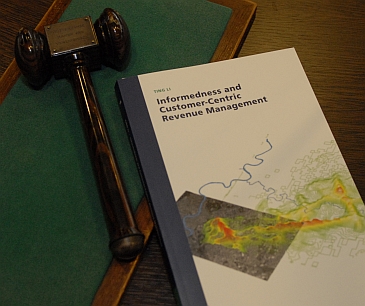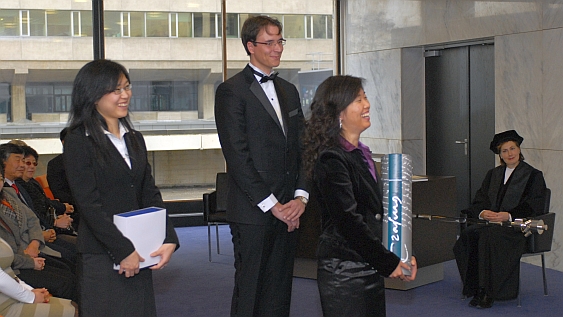Informedness and Customer-Centric Revenue Management
On Friday, January 16, <link people ting-li _blank>Ting Li has defended her PhD thesis entitled “<link erim events _blank>Informedness and Customer-Centric Revenue Management”.
 The past decade has witnessed an increased application of revenue management, where firms use various quantitative analysis techniques such as customer segmentation and pricing optimization to deal with capacity allocation and demand management. In particular, the demonstrated success in firms such as airlines and rental cars is encouraging scholars and practitioners alike to explore the possibilities of benefiting from revenue management. Yet despite the success in other transportation firms, public transport operators (PTOs) face difficulties in fully taking advantage of revenue management. Although PTOs have a strong need to reduce peak load passenger demand and increase capacity utilization, there are practical limitations that prevent them from exercising revenue management. PTOs state that “it is difficult to implement a profitable operating environment where the entire business strategy is based on ‘open access’ system for flexible travelling, and revenue management is nearly impossible for us.”
The past decade has witnessed an increased application of revenue management, where firms use various quantitative analysis techniques such as customer segmentation and pricing optimization to deal with capacity allocation and demand management. In particular, the demonstrated success in firms such as airlines and rental cars is encouraging scholars and practitioners alike to explore the possibilities of benefiting from revenue management. Yet despite the success in other transportation firms, public transport operators (PTOs) face difficulties in fully taking advantage of revenue management. Although PTOs have a strong need to reduce peak load passenger demand and increase capacity utilization, there are practical limitations that prevent them from exercising revenue management. PTOs state that “it is difficult to implement a profitable operating environment where the entire business strategy is based on ‘open access’ system for flexible travelling, and revenue management is nearly impossible for us.”
This situation starts changing with the increased implementation of mobile ticketing technologies enabled by smart cards and mobile devices in the public transport industry in the past decade all around the world. With these technologies, PTOs are able to learn passengers’ travel behavior, such as the location to and from which they travel, what time they travel, how frequently they travel, and what tickets they purchase, with far more precision, and can thus adjust services and prices accordingly to improve their operations and customer satisfaction. Thus, revenue management may become possible for them and their customers.
Her promoters are <link people peter-vervest _blank>Prof. dr. P.H.M Vervest and <link people eric-van-heck _blank>Prof. dr. ir. E. van Heck both at Rotterdam School of Management, Erasmus University. Other members of the Doctoral Committee are: Prof. dr. R. Kauffman (Arizona State University), Prof. dr. ir. J. van Nunen (Erasmus University), and Prof. dr. B. Dellaert (Erasmus University).
Li’s PhD research project is conducted within the Erasmus Doctoral Programme in Business & Management, organised by ERIM. The Erasmus Research Institute of Management (ERIM) is the joint research institute of the Rotterdam School of Management (RSM) and the Erasmus School of Economics (ESE) at Erasmus University Rotterdam.
About Ting Li
<link people ting-li _blank>Ting Li was born on October 12, 1977 in Beijing, China. She studied her undergraduate degree in Industry Engineering Management at Beijing University of Technology. In 1999, she was selected for a one-year exchange program in the Netherlands. Soon after she finished her B.Sc. degree, she was awarded an IBM graduate scholarship and started her M.Sc. degree in the University of Amsterdam with a major in Computational Science. During the same period, she worked in IBM Global Services and obtained her M.Sc. degree with the subject of web services and grid computing in 2002. The same year, she joined General Electric and worked primarily as a Six Sigma blackbelt and project manager in the area of e-business in supply chains.
In September 2004, Ting started her Ph.D. at the Department of Decision and Information Sciences at the Rotterdam School of Management, Erasmus University. In 2008, she spent six months as a visiting scholar in the W. P. Carey School of Business at the Arizona State University. Her research interests include the strategic use of information technology, pricing and revenue management, and business networks. Her work has been published in several edited books and is forthcoming in the European Journal of Information Systems. She has presented her work at various conferences including the Academy of Management, Workshop on Information Systems and Economics, Workshop on Information Technologies and Systems, Hawaii International Conference on System Sciences, Winter Simulation Conference, and Sunbelt. In 2007, she was invited to the doctoral consortium of the International Conference on Information Systems (ICIS). She currently serves as an ad-hoc reviewer for the Journal of Management Information Systems, International Journal of Electronic Commerce, and Electronic Commerce Research and Applications.
Next to her academic activities, Ting has also served on the organizing committee of the PREBEM (Ph.D. Researchers in Business Economics and Management) Conference in 2006 and the Smart Business Network Conference in 2008. Furthermore, she has been working as a pricing and revenue management consultant and project manager. She has also been a volunteer journalist for the Chinese Radio Amsterdam.
Abstract:
The recent pervasive adoption of modern IT in the marketplace has profoundly changed information availability to customers and firms. This improved information endowment results in changes in consumer behavior and corporate strategy. This dissertation proposes new theoretical perspectives – firm informedness, customer informedness, and informedness through learning – to re-conceptualize the decision making process of customer-centric revenue management. It consists of three studies. First, using multiple cases in which firms adopt smart cards and mobile technologies in America, Europe, and Asia, we examine the value creation process of the firm using the explanation of firm informedness and investigate how it advances revenue management. Second, we test the theory of consumer informedness and examine heterogeneity in consumer preferences using stated choice experiments. We find the evidence for trading down and trading out behavior and show that the use of mobile ticketing technologies can help firms to build a hyper-differentiated transport market. Finally, using a computational simulation, we explore the opportunity for devising service offerings to capture profitable consumer responses, considering demand-driven revenue and capacity-management. Overall, this research introduces methods, models, and guidelines for organizations to strategize the informational challenge, make informed decisions, and create transformational values to win in today’s competitive network environment.1`
More Information
Pictures of the Defense
Full Text of the Dissertation


